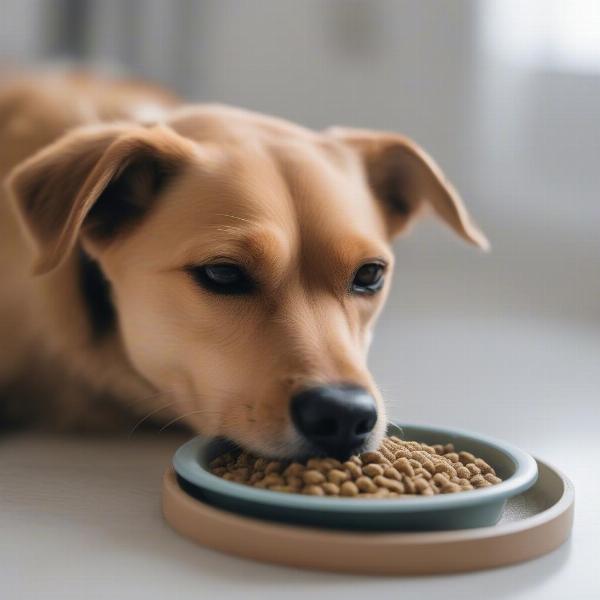Choosing the right dog food for kidney disease is crucial for managing your furry friend’s health. This comprehensive guide explores the importance of specialized diets, key ingredients to look for, and offers practical tips to help you navigate the options and make the best choice for your dog.
Understanding the Role of Diet in Canine Kidney Disease
Kidney disease, whether acute or chronic, significantly impacts a dog’s ability to filter waste products and maintain fluid balance. A specialized diet plays a vital role in supporting kidney function and improving your dog’s overall quality of life. These diets are typically lower in protein, phosphorus, and sodium, which helps reduce the workload on the kidneys. They often include increased levels of omega-3 fatty acids and antioxidants to combat inflammation and support overall health.
 Dog enjoying kidney-friendly food
Dog enjoying kidney-friendly food
Key Ingredients to Look for in Kidney-Friendly Dog Food
When selecting a kidney-friendly diet, look for these key features:
- Reduced Protein: While protein is essential, lower levels help minimize waste product buildup. However, the protein included should be of high quality to ensure your dog still receives essential amino acids.
- Controlled Phosphorus: Phosphorus restriction is vital in managing kidney disease progression. Lower phosphorus levels help reduce stress on the kidneys.
- Low Sodium: Restricting sodium helps regulate blood pressure and fluid balance, which is often disrupted in dogs with kidney disease.
- Omega-3 Fatty Acids: These essential fatty acids have anti-inflammatory properties that can benefit kidney health.
- Antioxidants: Antioxidants help protect cells from damage and can support overall well-being.
Choosing the Right Commercial Dog Food for Kidney Issues
Several commercial dog food brands offer specialized formulas for kidney disease. Consult your veterinarian to determine the best option for your dog’s specific needs. They can assess your dog’s condition and recommend a diet that meets their individual requirements. Some popular choices include prescription diets and over-the-counter options like royal canin kidney dog.
What about Homemade Food for Dogs with Kidney Problems?
Some owners prefer preparing homemade meals for their dogs with kidney disease. While this approach offers control over ingredients, it’s crucial to consult a veterinary nutritionist. They can help you formulate a balanced recipe that meets your dog’s specific nutritional needs and avoids deficiencies. You can find some helpful resources on homemade food for dogs with kidney problems.
Monitoring Your Dog’s Response to the New Diet
Once you’ve introduced a new kidney-friendly diet, carefully monitor your dog’s response. Observe their appetite, energy levels, and overall well-being. Regular check-ups with your veterinarian are crucial to assess kidney function and adjust the diet if necessary. Keep a record of your dog’s food intake, water consumption, and any changes in their behavior.
Is Wet or Dry Food Better for Dogs with Kidney Disease?
Both wet and dry foods can be suitable for dogs with kidney disease, depending on the individual dog’s preferences and health status. Some dogs with reduced appetite may find wet food more palatable, while others may prefer the texture of dry kibble. Discuss with your vet which form is best for your dog. You can explore options like purina nf canned dog food or forza10 wet dog food kidney renal actiwet.
Conclusion
Selecting appropriate dog food for kidney disease is a vital component of managing the condition. By understanding the key ingredients to look for and working closely with your veterinarian, you can provide your dog with the nutritional support they need to maintain a good quality of life. Remember to monitor their response to the diet and adjust as needed under veterinary guidance.
FAQ
-
What are the signs of kidney disease in dogs? Increased thirst and urination, decreased appetite, weight loss, vomiting, and lethargy.
-
Can kidney disease be cured in dogs? While chronic kidney disease cannot be cured, it can be managed with proper diet, medication, and veterinary care.
-
How long can a dog live with kidney disease? This varies depending on the severity of the disease and how well it is managed. Some dogs can live for years with proper care.
-
Are there any treats I can give my dog with kidney disease? Yes, but choose treats specifically formulated for dogs with kidney disease and offer them in moderation.
-
Is it expensive to feed a dog with kidney disease? Specialized diets can be more expensive than regular dog food, but the investment is crucial for your dog’s health.
-
Can I switch my dog’s food to a kidney diet suddenly? No, gradual transition is important to avoid digestive upset.
-
What if my dog refuses to eat their kidney diet? Talk to your vet. They may suggest ways to make the food more palatable or recommend a different formula.
ILM Dog is your trusted resource for expert advice on all aspects of dog care, from breed selection to senior care. We are dedicated to providing dog owners worldwide with the information they need to make informed decisions about their furry companions. Our experts offer insights into health and medical care, training, nutrition, grooming, exercise, and much more. Learn more about small breed dog food needs by visiting our dedicated page: wellness core dog food small breed. Contact us today for personalized support! Email: [email protected], Phone: +44 20-3965-8624. ILM Dog is here to help you navigate your dog’s kidney health journey.